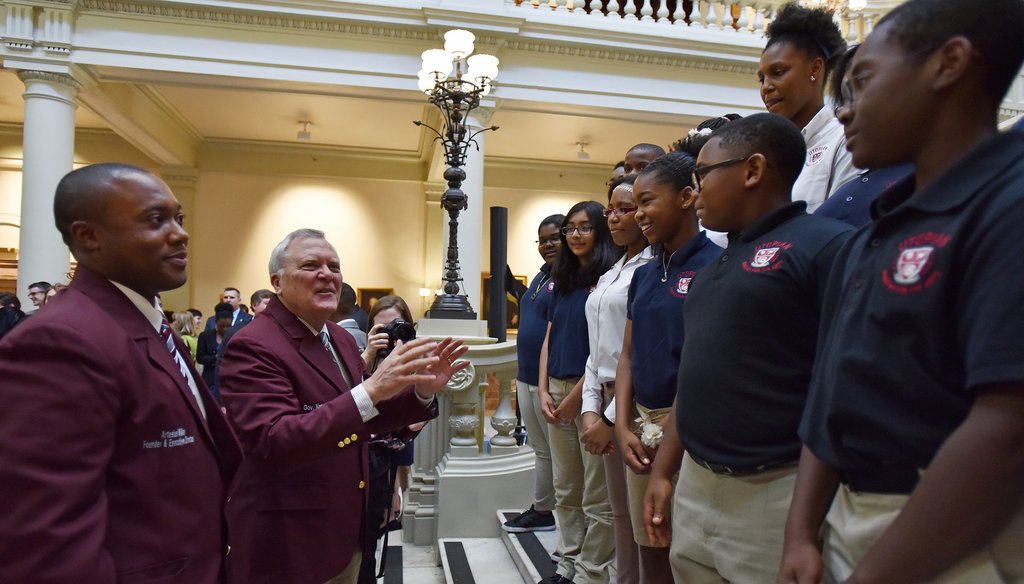Get PolitiFact in your inbox.

Gov. Nathan Deal greets students from Utopian Academy after signing House Bill 372 to persuade voters to support his plan to allow the state takeover of Georgia’s failing schools. Photo by Hyosub Shin / AJC
Education was a major issue in last year’s race for governor but was not a breakout topic in the recently ended Legislative session.
Still, lawmakers did approve major education-related measures this year, includinga plan to create a special state-run district to take over failing schools
And Gov. Nathan Deal also touted the $21.8 billion budget that takes effect in July as a win for education.
With big claims come big fact checks. Here are some of PolitiFact Georgia’s favorite recent rides on the Truth-O-Meter for education issues.
AUSTERITY CUTS
Georgia's public schools were last fully funded under the state funding formula in 2002.
That will continue to be the case when fiscal 2016 starts on July 1, though the financial picture for schools is looking up.
Last year, with the governor and all 236 members of the General Assembly facing re-election, the so-called state austerity cut to K-12 education was reduced by about $314 million.
Deal pushed for more this year, proposing a budget that committed an additional $280 million to K-12 education and gave local school systems would have flexibility to spend the money to reduce or eliminate furlough days, increase instructional days or raise salaries.
Lawmakers tweaked the proposal, but the austerity cut to schools should fall below $500 million for Fiscal Year 2016, Alan Essig, executive director of the left-leaning Georgia Budget & Policy Institute said in a recent blog post.
That would reduce the austerity cut from about $746 million to about $466 million.
We rated Essig's statement that the austerity cuts have dropped as True.
THE FAILED VOUCHER EXPANSION
The Georgia House has passed and sent to the state Senate a bill to expand the state's special needs voucher program to include some legal refugees.
House Bill 296 would open the scholarship program, which was created in 2007, to about 700 school-age, legal refugees who are not proficient in English.
The bill's chief sponsor, state Rep. Randy Nix, R-La-Grange, told PolitiFact the qualifying students "are legal, and Georgia is obligated to educate them."
The highest concentrations of these students are in metro Atlanta, especially the Clarkston area of DeKalb County, he said.
The measure stalled in the Senate but, had it been approved, the scholarship program would have been open to students who meet the definition of legal refugee under Title I of the Immigration and Nationalization Act.
We rated the statement True.
SCHOOL FUNDING
Deal reiterated during his State of the State of address that education remains a budget priority for his administration.
"This year's budget, coupled with my proposal for next year's budget, represents an infusion of over one billion additional dollars for k-12 education," he told a joint session of the state House and Senate on Jan. 14.
The budget to k-12 education did grow by $1 billion in two budget cycles. But the majority of the additional money is going to reduce austerity cuts from $1 billion down to about $460 million and to cover routine student enrollment growth.
That’s important context the reader needed to know.
We rated Deal's statement as Half True.
Our Sources
See individual reports.
















































